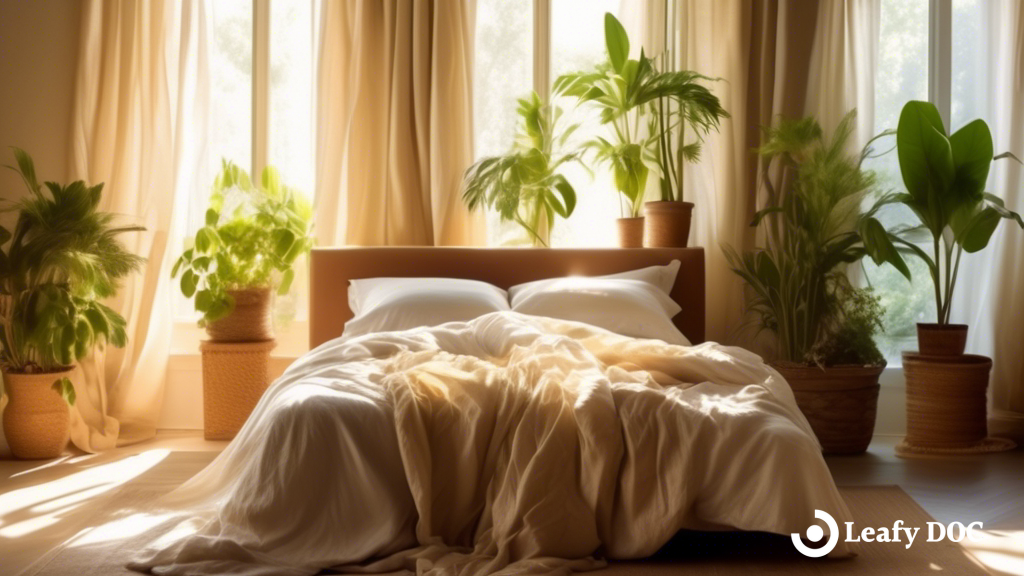The Impact Of THC On REM Sleep: Exploring Cannabis And Sleep Disorders
by Tayyaba Amir · March 30, 2024
Unveiling the Impact of THC on REM Sleep: Find out how cannabis affects sleep disorders and improve your sleep quality today! Click now for the hidden connection between THC and REM sleep.

Do you ever find yourself tossing and turning in bed, desperately longing for a restful night’s sleep? Imagine a world where you could easily slip into a deep slumber, your mind and body rejuvenating as you peacefully dream away. Well, my friend, there may be a solution that could help you achieve just that – cannabis.
In this article, we will delve into the fascinating realm of the sleep cycle, specifically focusing on REM sleep, and explore the impact of THC, the psychoactive compound in cannabis, on this crucial stage of rest. Before we dive into the intricate relationship between THC and REM sleep, it’s important to grasp the concept of the sleep cycle.
Just like the ebb and flow of the ocean’s tides, our sleep follows a rhythmic pattern, consisting of different stages that repeat throughout the night. At the heart of this cycle lies REM sleep, a phase characterized by vivid dreams, rapid eye movement, and increased brain activity. It is during this stage that our minds consolidate memories and process emotions, essential for our overall well-being.
However, for those plagued by sleep disorders, such as insomnia or sleep apnea, achieving a healthy amount of REM sleep can be a real challenge. That’s where cannabis and its potential role in sleep regulation come into play. So, grab a cozy blanket, settle in, and let’s embark on this enlightening journey through the impact of THC on REM sleep.
Key Takeaways
- THC impacts the duration and quality of REM sleep, helping with falling asleep faster but decreasing time spent in REM sleep.
- THC suppresses dreaming, a key aspect of REM sleep, and disrupts the normal sleep cycle, potentially impacting memory and cognitive function.
- Cannabis may be a potential solution for sleep disorders like insomnia, sleep apnea, and restless legs syndrome, but its effects on REM sleep and overall sleep quality should be considered.
- Regular THC use can disrupt REM sleep, and lead to tolerance and dependence, so consulting a healthcare professional is recommended before using cannabis for sleep disorders.
Understanding the Sleep Cycle and REM Sleep
REM sleep, which is an important stage in the sleep cycle for dreaming and memory consolidation, typically makes up about 20-25% of your total sleep time. During this stage, your brain is highly active, and your eyes move rapidly.
It is during REM sleep that you experience the most vivid and memorable dreams. This stage is also important for memory formation and emotional processing. It is believed that REM sleep helps your brain process and consolidate information from the day, making it easier for you to remember and learn new things. So, if you want to wake up feeling refreshed and ready to serve others, it’s essential to get enough REM sleep.
But how does cannabis, specifically THC, impact REM sleep? Well, research suggests that THC can affect the duration and quality of REM sleep. While THC can help you fall asleep faster, it may also decrease the amount of time you spend in REM sleep. This can disrupt your sleep cycle and potentially impact your memory and cognitive function.
Additionally, THC has been found to suppress dreaming, which is a key aspect of REM sleep. So, if you rely on cannabis to help you sleep, it’s important to be aware of its potential effects on your REM sleep and overall sleep quality.
The Role of THC in Sleep Regulation
To fully understand how THC affects your sleep, it’s important to consider its role in regulating your sleep patterns. THC, the psychoactive compound found in cannabis, interacts with the endocannabinoid system in your body, which plays a key role in maintaining homeostasis. This system helps regulate various bodily functions, including sleep.
When THC enters your system, it binds to the cannabinoid receptors in your brain, particularly the CB1 receptors, which are abundant in areas associated with sleep regulation. Once THC binds to these receptors, it can have both sedating and stimulating effects on your sleep.
On one hand, THC has been found to decrease the time it takes to fall asleep, making it easier for you to drift off into a slumber. It also has the potential to prolong the duration of your sleep, allowing you to get a more restful night.
However, it’s important to note that THC can also disrupt the normal sleep cycle, particularly the REM (rapid eye movement) stage of sleep. REM sleep is significant for processing emotions, consolidating memories, and promoting overall cognitive function. Studies have shown that THC can suppress REM sleep, leading to a decrease in dream recall and potentially impacting your overall sleep quality.
While THC may have some benefits in promoting sleep, it’s important to consider its potential impact on the different stages of sleep, especially REM sleep. If you’re using cannabis to aid with sleep, it’s essential to find a balance that works for you and consult with a healthcare professional if you have any concerns about your sleep patterns.
Effects of Cannabis on REM Sleep
When you use cannabis, it can disrupt your REM sleep patterns, leading to potential sleep problems. REM sleep is an important stage of the sleep cycle where dreaming occurs and the brain processes emotions and memories.
However, THC, the psychoactive compound in cannabis, has been found to decrease the amount of time spent in REM sleep. This can result in a reduction in dream recall and a disruption in the normal sleep cycle.
Studies have shown that cannabis use can lead to a decrease in REM sleep latency, which is the time it takes for you to enter the REM sleep stage after falling asleep. This means that when you use cannabis, you may enter the REM stage more quickly, but spend less time in it overall. This can lead to a decrease in the overall quality of your sleep and leave you feeling less rested in the morning.
Additionally, the use of cannabis has been associated with a decrease in the intensity and frequency of dreams. This is because THC can suppress the REM sleep stage, which is when most vivid dreams occur. As a result, you may experience fewer memorable dreams and have a harder time recalling them upon waking.
Cannabis as a Treatment for Sleep Disorders
Imagine how effective cannabis could be in treating your sleep disorders. With its natural properties and potential therapeutic effects, cannabis has been increasingly recognized as a potential solution for various sleep disorders. Research suggests that certain compounds found in cannabis, such as THC, may help regulate sleep patterns and promote a more restful night’s sleep.
One way cannabis may aid sleep disorders is by reducing the time it takes to fall asleep, also known as sleep latency. THC, the psychoactive compound in cannabis, has been shown to have sedative effects that can help you relax and unwind before bedtime. Additionally, studies have suggested that THC may increase the amount of deep sleep, also known as slow-wave sleep, which is essential for rejuvenating the body and promoting overall well-being.
To better understand the potential benefits of cannabis as a treatment for sleep disorders, let’s explore the following table:
| Sleep Disorder | Potential Benefits of Cannabis |
|---|---|
| Insomnia | Reduces sleep latency and promotes deep sleep |
| Sleep Apnea | May alleviate symptoms and improve sleep quality |
| Restless Legs Syndrome | Relieves discomfort and promotes relaxation |
Potential Risks and Considerations
Considering the potential risks and considerations, it’s important to understand how THC affects the quality of our sleep. While cannabis has been shown to have potential benefits for sleep disorders, it’s important to be aware of the potential drawbacks as well.
Here are some key points to consider:
- THC can disrupt REM sleep: THC has been found to suppress REM sleep, which is the stage of sleep associated with vivid dreams. While this may be beneficial for individuals suffering from nightmares or PTSD, it can also lead to a decrease in the overall quality of sleep.
- Tolerance and dependence: Regular use of THC can lead to tolerance, meaning that higher doses are needed to achieve the same effects. This can potentially lead to dependence and withdrawal symptoms when trying to quit or cut back on cannabis use.
Considering these potential risks, it’s important to approach the use of THC for sleep disorders with caution. It may be beneficial to consult with a healthcare professional who can provide guidance and monitor your progress. Additionally, exploring other non-pharmacological approaches such as cognitive-behavioral therapy for insomnia (CBT-I) or relaxation techniques may also be worth considering.
Frequently Asked Questions
How long does it typically take for THC to start affecting REM sleep after consumption?
After consuming THC, it typically takes around 30 minutes to an hour for it to start affecting REM sleep. This can lead to a reduction in the amount of time spent in REM sleep, impacting the overall quality of your sleep.
Are there any specific strains or types of cannabis that are more effective in promoting REM sleep?
Looking for the perfect strain to promote REM sleep? Well, you’re in luck! Some cannabis strains, like Granddaddy Purple or Afghan Kush, are known for their relaxing properties, making them ideal for a good night’s rest.
Can THC usage lead to long-term changes in REM sleep patterns?
Yes, long-term THC usage can lead to changes in REM sleep patterns. While THC may initially increase REM sleep, continued use can result in decreased REM sleep and disruptions in the sleep cycle.
What are some alternative treatments for sleep disorders that do not involve cannabis?
Looking for alternative treatments for sleep disorders? Some options don’t involve cannabis. Consider exploring relaxation techniques, creating a soothing sleep environment, or consulting with a healthcare professional for personalized recommendations.
Are there any specific populations or individuals who should avoid using cannabis for sleep disorders due to potential risks?
If you have certain conditions like heart disease, mental health disorders, or are pregnant or breastfeeding, it’s best to avoid using cannabis for sleep disorders. The potential risks could outweigh the benefits.
Last Updated: August 8, 2024
Get Approved for Your Medical Marijuana Card in Minutes!

Get Your Medical Card
Connect with a licensed physician online in minutes

Like This Article?
Share with your friends
Table of Contents
Keep Reading
-
Cannabis Bath Bombs: A New Way to Relax
Unwind and relax with the ultimate cannabis experience! Learn how to make THC-infused bath bombs for a luxurious and therapeutic soak. Perfect for all levels of cannabis users!
-
5 Innovative Women Paving The Way For The Cannabis Industry
Check out these inspiring stories of 5 pioneering women who revolutionized the cannabis industry. Their groundbreaking innovations will blow your mind!
-
Managing Chemotherapy Side Effects With Cannabis
Find relief from chemotherapy side effects with cannabis. Learn about the latest research and discover how this natural remedy can help you. Click now to manage your symptoms effectively!



